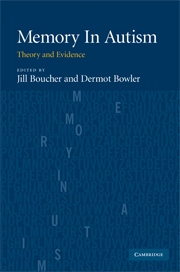Book contents
- Frontmatter
- Contents
- List of tables
- List of figures
- List of contributors
- Foreword
- Preface
- Part I Introduction
- Part II The neurobiology of memory in autism
- Part III The psychology of memory in autism
- Part IV Overview
- 15 Practical implications of memory characteristics in autistic spectrum disorders
- 16 A different memory: are distinctions drawn from the study of nonautistic memory appropriate to describe memory in autism?
- 17 Memory in ASD: enduring themes and future prospects
- Index
17 - Memory in ASD: enduring themes and future prospects
Published online by Cambridge University Press: 05 November 2009
- Frontmatter
- Contents
- List of tables
- List of figures
- List of contributors
- Foreword
- Preface
- Part I Introduction
- Part II The neurobiology of memory in autism
- Part III The psychology of memory in autism
- Part IV Overview
- 15 Practical implications of memory characteristics in autistic spectrum disorders
- 16 A different memory: are distinctions drawn from the study of nonautistic memory appropriate to describe memory in autism?
- 17 Memory in ASD: enduring themes and future prospects
- Index
Summary
Introduction
Memory difficulties are neither a prominent nor a defining feature of autism spectrum disorders (ASDs) yet these conditions are characterized by a consistent pattern of memory strengths and weaknesses. The earliest clinical reports of autistic memory often commented on good rote memory, and early experimental investigations mapped out a profile of spared and impaired areas of memory performance as well as highlighting the reduced role of structure and meaning in enhancing memory performance. The enlargement seen in the last two decades of our conception of autism to that of a spectrum of related conditions has been accompanied by research that has both confirmed many of these early findings in a wider diagnostic context and has also established distinct patterns of performance in other memory processes, such as an attenuated sense of self-awareness when recalling the personally experienced past and a diminished recall of incidentally encoded context. We now have sufficient understanding of memory in people with autism to enable some speculations about why in this group some memory processes should function typically and others not. Such speculations can also provide us with insights into how memory interacts with and depends on other psychological processes in ASD-specific ways, insights that in turn can illuminate a broader range of psychological functioning in this population.
- Type
- Chapter
- Information
- Memory In AutismTheory and Evidence, pp. 330 - 349Publisher: Cambridge University PressPrint publication year: 2008
- 18
- Cited by



